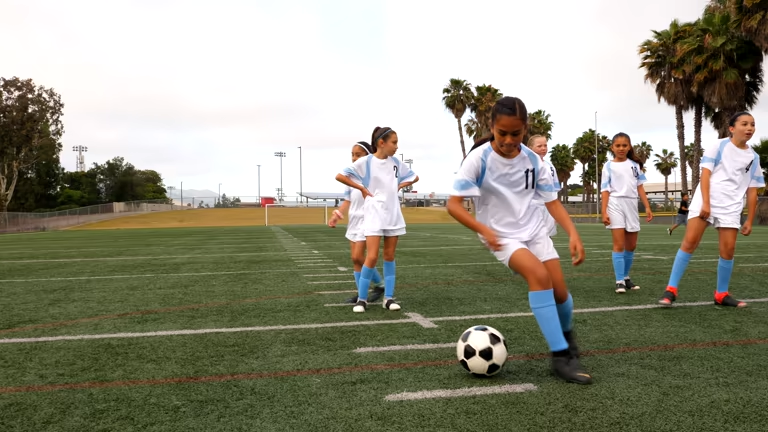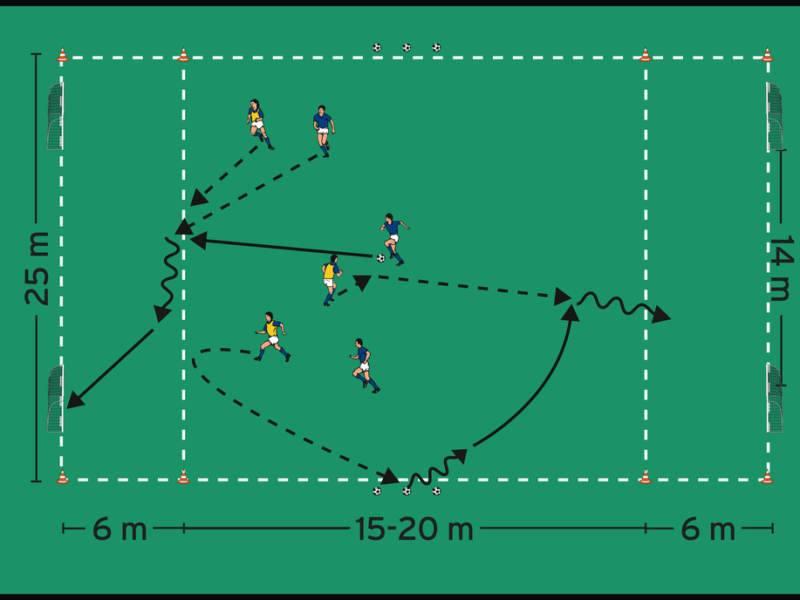Are you a high school soccer player who aspires to play in college? The whole college recruitment thing can be pretty overwhelming. You might be great on the pitch, but deep inside, you wonder, “What else can I do to get better chances of being recruited?”
One of the increasingly popular options to do this is taking a post-graduate year, or PG year.
A postgraduate year is what it sounds like: another additional year of high school that places a buffer for a student-athlete, such as a soccer player, to mature either academically, athletically, or both.
It’s a choice an increasing amount of athletes make in order to sharpen their skills, improve their academics, and thus oftentimes enhance their chances of making it onto the next level.
But what precisely is a post-grad year in soccer? Why do more players decide to go for it? How does it help you, and is it the right way for you?
We are going to break it down in detail.
What Is a Post-Grad Year?

A post-grad year is usually an extra year of schooling at a private prep school added to the already completed high school.
This has lately become very common among many sports where players take this available year for extra development in their skills, getting a stronger academic resume, and to better equip themselves for college soccer.
You are thinking, “Why would I need an extra year of high school when I could just go on to college?” A PG year does not mean repeating high school; it means giving yourself an extra boost in the right areas.
Whether it is to improve your GPA, gain physical development, or fine-tune your technical skills on the soccer pitch, a PG year should afford you the opportunity to step into college as a more well-rounded and competitive student-athlete.
Why Would Soccer Players Take a PG Year?
There can be a number of reasons that soccer players choose to take a PG year. Let’s look into some of the more common ones.
1. To Improve Athletic Ability
Prima facie, athletes attend a PG year for soccer to improve their athletic skills.
A post-grad soccer player gets an opportunity to train harder, to play more often, and to have games against top-level opponents.
That may be that extra year of development that makes all the difference for other players. Maybe you are one of those late bloomers who hasn’t quite caught up physically or your technical skills just need a little more polish before you’re ready for the college level.
A PG year offers a structured environment to focus on athletic growth without the immediate pressure of college academics.
It’s not uncommon for an athlete to grow several inches during their PG year or greatly improve in regards to stamina and strength, so their physical abilities are matching up with their soccer skills.
That makes you a more competitive recruit when it’s time for college coaches to scout talent.
CHECK OUT | NIL In College Soccer: Here’s What You Need To Know
2. To Improve Academic Standing
Soccer players are not only athletes but also students. The recruitment of colleges depends not entirely on your gameplay but also on the academic performance.
If in high school, there were any weak moments with your academic standing, PG year gives time and support needed for its improvement.
Many postgraduate programs provide an avenue for intensive academic classes besides the athletic training. In this way, one is able to raise his GPA, retake standardized tests, and generally present himself as a more attractive candidate to college admissions officers.
A good academic record opens doors to many prestigious schools and athletic programs.
3. For Exposure to College Coaches
Perhaps one of the most critical challenges in recruitment is simply getting noticed. Most high school players go unnoticed by college coaches especially if they are coming out of the smaller schools or even less competitive leagues.
A PG year can provide much more exposure to college coaches who frequently attend the PG games and tournaments.
Many times these prep schools have built relationships with college programs and can vouch for you as a coach. They know what college coaches look for, and they’re able to make you aware of those things in your game that may be holding you back from getting noticed at recruiting showcases and tournaments.
That extra year with exposure and networking may be exactly what you need to get your foot in the right door.
4. So You can Mature and Gain Life Skills
It is not just soccer that changes as you go into college, it is your whole life. A PG year may provide you with a transition period to learn how to live away from home, control your schedule, and balance academics with athletics.
In your PG year you will be in an environment much like college. You might be one of the several that have to live in dorms away from home and learn how to deal with the world on your own without immediate family helping you.
This freedom prepares you for college, where you have to wake yourself up, manage your school schedule, and be at soccer practice on time.
How to Handle the Soccer Post-Grad Experience
Once you have made a decision that you want to pursue a PG year, the hard work really begins. This can be an exhilarating yet overwhelming time, and so you will want to make sure you are prepared to make the most out of this experience.
Choosing the Right School and Program
The first major decision you will have to make is the choosing of an appropriate PG program. Not all factors can be considered while choosing a school and all PG programs are not equal either.
The research into the program’s reputation and their track record for placing athletes is a good place to start. Some prep schools have a history for placing their student-athletes into the top college programs in the country.
Either they have good relationships with college coaches, or they have their soccer programs designed to make players “college-ready.”.
After that comes the school itself: a number of the top-rated PG programs are located in the Northeast, which has rich soccer culture and is very competitive.
Phillips Exeter Academy, South Kent, and Northfield Mount Hermon have churned out droves of college athletes.
Other powerhouse programs include Florida’s IMG Academy, New Hampshire’s Tilton School, and Massachusetts’ Berkshire School.
Finally, consider the academics.
You are still a student after all, and the PG program’s academic offerings should be a concern. Ideally, you would like to attend a school which will challenge you academically and at the same time support you in such a manner as to help attain success.
Many of the PG programs offer small class size, dedicated faculty, and specialized tutoring which can help meet set academic goals.
CHECK OUT | Do College Soccer Players Earn Money For Playing?
Life as a Post-Grad Soccer Player
Once you’ve chosen a school, what do you expect from life as a post-grad soccer player?
Number one, your life is going to be pretty busy. You are going to have a very hectic schedule right from training to games, academic classes, and even extracurricular activities if any.
Most PG programs run like a more regular high school or college schedule. In the fall, you will most likely be right in the middle of soccer season, tucking away games and practices in with your classwork. Some programs will even enable you to continue playing for your U-18 or U-19 club team, which means even more soccer on your plate.
Time management will be key.
You’ll need to be organized and disciplined because academics and athletics will most likely be equally demanding. But it will pay off.
That’s what the purpose of the PG year is-to take you to the limit so that when you get into college, you’re ready for what’s about to come your way.
College or PG Year: How to Decide
It’s a tough call as to whether to head directly to college or to take a PG year, and it can also be terribly personal. Here are some factors that may help you choose whether a PG year is right for you.
You might want to jump right into college if:
- You have already been recruited by your top-choice schools.
- Your grades/test scores are good, and you don’t need a year to get better academically.
- You feel that you’re prepared to have an impact on a college team in the upcoming year.
On the contrary, a PG year may be the most prudent option if:
- Your grades aren’t quite where they need to be to get into your desired school.
- You’re physically still developing and could use an extra year to grow.
- You are a high school graduate who feels overlooked by college coaches and want more exposure.
Where to Take a PG Year
As touched upon briefly above, many of the top PG programs for soccer are on the northeastern part of the United States.
Some schools to consider include:
- Berkshire School of Sheffield, MA : has high academic standards with a highly competitive soccer team.
- Peddie School, Hightstown, NJ: A well-respected preparatory school with a strong athletic tradition.
- Phillips Exeter Academy NH: being well regarded with solid academics and competitive athletics teams.
- IMG Academy Bradenton, FL -:one of the most respected sports academies in the country – dedicated to the development of elite athletes.
- Tilton School of Tilton, NH : offers strong academics coupled with competitive athletics.
- South Kent School of South Kent, CT : has long been a top choice for soccer players and has many D1 placements.
- Northfield Mount Hermon in Gill, MA: offers strong value on academics coupled with strong athletic competition.
Each of these schools offers a unique mix of academics, athletics, and personal development; if at all possible, take the time to research each school and visit campuses if you can.
Is a PG Year Right for You?
It’s not for everyone, and it’s not a necessity for each and every one, but for the right player, it’s a game-changer.
If you’re someone who could benefit from an extra year of growth-on the soccer field, in the classroom, or in personal maturity-then a PG year could be that perfect next step.
Ultimately, it is a decision that must be weighed thoughtfully in light of your goals, both athletic and academic. It’s also one that should be made along with your family, coaches, and academic advisors.
Keep in mind that a PG year doesn’t promise a college soccer scholarship, but it surely will make the chances a lot easier to attain. Using this year for development purposes will prepare you not only for soccer but also for life.
Good luck on your journey, and may you find the path that leads to your dreams!



